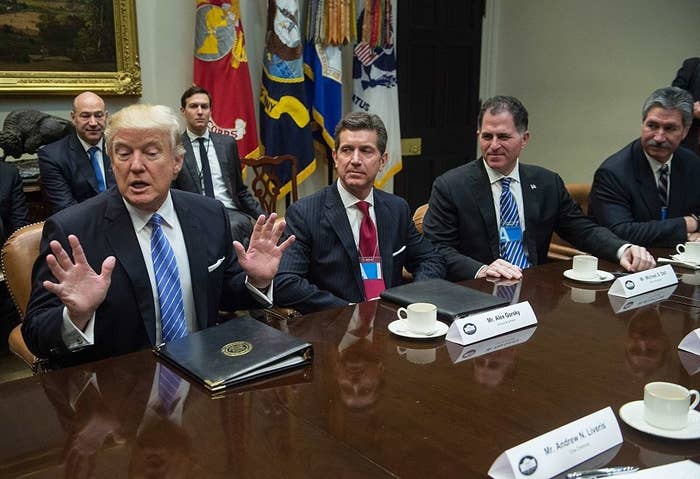
As most of corporate America stayed quiet this weekend on the issue of President Trump's immigration order, one industry stood out in the silent crowd. And ironically, it was the same one that's often maligned for not going far enough in speaking up for its self-proclaimed values.
"Will tech leaders come out strongly and publicly against Trump's Muslim ban?" tweeted Recode's Kara Swisher, addressing the industry elite who follow her. "I'm taking names."
Throughout the weekend, they spoke. It was mostly cautious, often to the point of meaningless — "I hope we find the courage and compassion to bring people together and make this world a better place for everyone," concluded Facebook CEO Mark Zuckerberg.
But it was something, which is more than can be said for the rest of corporate America, whose leaders have largely remained behind a wall of silence since Friday's announcement, even as plenty of their employees and customers at home and around the world were facing the prospect of being banned from entering the United States.
Take Wall Street, where big banks spend tens of millions every year pressuring Washington on the things they consider important. Representatives of Bank of America, Goldman Sachs and Morgan Stanley all declined to comment or did not reply yesterday when contacted by reporters.
JPMorgan, the country's largest bank, passed along a note that was sent to staff. "We are grateful for the hard work and sacrifices made to keep our country safe," it said. "At the same time, we understand that our country, economy and wellbeing are strengthened by the rich diversity of the world around us." And that's what the outspoken side of Wall Street had to say.
The gap between Silicon Valley and pretty much everyone else in corporate America has often been a rhetorical one
McDonald's, a major employer of immigrants, has said nothing, and neither has Walmart, the country's largest private-sector employer.
When the Huffington Post looked at the US companies whose CEOs signed up as advisors to President Trump — more than a dozen big-name businesses including Disney, General Motors and Blackstone — just two had something to say on Saturday: Tesla and Uber.
(General Electric CEO Jeff Immelt, a member of the group, has since sent a note to employees saying the company will work with the Trump administration to "strive to find the balance between the need for security and the movement of law-abiding people.)
The gap between Silicon Valley and pretty much everyone else in corporate America has often been a rhetorical one: the reason most see Uber as a tech company, but not Ford, is mostly about how these companies talk about themselves, and how we listen to them.
But in the case of this weekend's madness, it has been illuminating. When it comes to taking a stand, people simply expect more from internet companies than they do from everyone else — in large part because of the we're-the-good-guys posture of the tech industry.
When a serious line is crossed in Washington, there's an assumption that Mark Zuckerberg should say something about it; nobody is holding their breath for the CEO of Bank of America. Google's co-founder — one of the world's richest men — showing up at San Francisco's international airport on Saturday night to join the protests was warmly received but not shocking; the concept of Lloyd Blankfein joining the crowd at JFK is imaginable only in surrealist parody.
The gap between Silicon Valley and most other businesses is also a function of what we mean when we say "Silicon Valley" now — there has been little pressure on the leaders of enormous-but-boring Bay Area Fortune 500 companies like Salesforce or Oracle to speak up. What people are really talking when they talk about Silicon Valley is companies like Google, Twitter and Facebook, all of which depend on their giant communities of users.
Those companies have benefited hugely from convincing the public that they are, in the broadest strokes, the good guys. Google's don't-be-evil motto set the tone for many companies that followed, each of whom spoke of their mission to connect the world and give people a voice in painfully earnest terms.
With a level of good faith established, each built massive businesses based on the fundamentally creepy premise of hyper-targeted online advertising, turning baby photos and searches about that weird rash on your leg into a gush of advertising dollars.
It's very nice work if you can get it, and it's hard not to connect the dots between Silicon Valley's aspirational selling points and the statements coming from it's leaders this weekend. It may feel good to speak out, but it's also an important part of the recipe that has made it rain gold in parts of Northern California for the last decade.
In the rest of corporate America, where most businesses were built without the pretense of righteousness, speaking out seems like an unnecessary risk, or a distraction from their true purpose. For the nice guys of the tech industry, it has become a cost of doing business.
